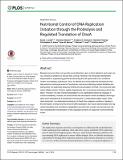| dc.contributor.author | Leslie, David J. | |
| dc.contributor.author | Heinen, Christian | |
| dc.contributor.author | Schramm, Frederic D. | |
| dc.contributor.author | Aakre, Christopher David | |
| dc.contributor.author | Murray, Sean M. | |
| dc.contributor.author | Laub, Michael T. | |
| dc.contributor.author | Jonas, Kristina | |
| dc.contributor.author | Thuring, Marietta | |
| dc.date.accessioned | 2015-08-20T17:05:53Z | |
| dc.date.available | 2015-08-20T17:05:53Z | |
| dc.date.issued | 2015-07 | |
| dc.date.submitted | 2015-03 | |
| dc.identifier.issn | 1553-7404 | |
| dc.identifier.issn | 1553-7390 | |
| dc.identifier.uri | http://hdl.handle.net/1721.1/98121 | |
| dc.description.abstract | Bacteria can arrest their own growth and proliferation upon nutrient depletion and under various stressful conditions to ensure their survival. However, the molecular mechanisms responsible for suppressing growth and arresting the cell cycle under such conditions remain incompletely understood. Here, we identify post-transcriptional mechanisms that help enforce a cell-cycle arrest in Caulobacter crescentus following nutrient limitation and during entry into stationary phase by limiting the accumulation of DnaA, the conserved replication initiator protein. DnaA is rapidly degraded by the Lon protease following nutrient limitation. However, the rate of DnaA degradation is not significantly altered by changes in nutrient availability. Instead, we demonstrate that decreased nutrient availability downregulates dnaA translation by a mechanism involving the 5' untranslated leader region of the dnaA transcript; Lon-dependent proteolysis of DnaA then outpaces synthesis, leading to the elimination of DnaA and the arrest of DNA replication. Our results demonstrate how regulated translation and constitutive degradation provide cells a means of precisely and rapidly modulating the concentration of key regulatory proteins in response to environmental inputs. | en_US |
| dc.description.sponsorship | National Institutes of Health (U.S.) (Grant 5R01GM082899) | en_US |
| dc.language.iso | en_US | |
| dc.publisher | Public Library of Science | en_US |
| dc.relation.isversionof | http://dx.doi.org/10.1371/journal.pgen.1005342 | en_US |
| dc.rights | Creative Commons Attribution | en_US |
| dc.rights.uri | http://creativecommons.org/licenses/by/4.0/ | en_US |
| dc.source | Public Library of Science | en_US |
| dc.title | Nutritional Control of DNA Replication Initiation through the Proteolysis and Regulated Translation of DnaA | en_US |
| dc.type | Article | en_US |
| dc.identifier.citation | Leslie, David J., Christian Heinen, Frederic D. Schramm, Marietta Thüring, Christopher D. Aakre, Sean M. Murray, Michael T. Laub, and Kristina Jonas. “Nutritional Control of DNA Replication Initiation through the Proteolysis and Regulated Translation of DnaA.” Edited by William F. Burkholder. PLOS Genetics 11, no. 7 (July 2, 2015): e1005342. | en_US |
| dc.contributor.department | Massachusetts Institute of Technology. Department of Biology | en_US |
| dc.contributor.mitauthor | Aakre, Christopher David | en_US |
| dc.contributor.mitauthor | Laub, Michael T. | en_US |
| dc.relation.journal | PLOS Genetics | en_US |
| dc.eprint.version | Final published version | en_US |
| dc.type.uri | http://purl.org/eprint/type/JournalArticle | en_US |
| eprint.status | http://purl.org/eprint/status/PeerReviewed | en_US |
| dspace.orderedauthors | Leslie, David J.; Heinen, Christian; Schramm, Frederic D.; Thüring, Marietta; Aakre, Christopher D.; Murray, Sean M.; Laub, Michael T.; Jonas, Kristina | en_US |
| dc.identifier.orcid | https://orcid.org/0000-0002-8288-7607 | |
| dspace.mitauthor.error | true | |
| mit.license | PUBLISHER_CC | en_US |
| mit.metadata.status | Complete | |
